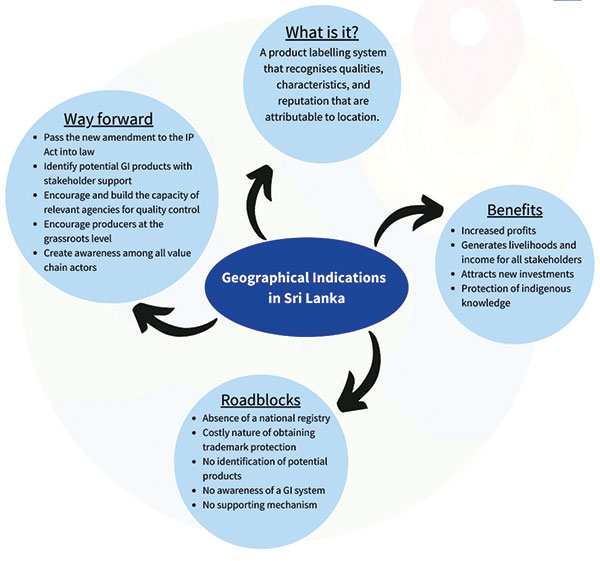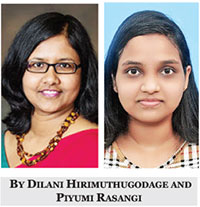Business
Geographical Indications for Sri Lankan products: The need to expand local registration

Sri Lanka obtained its first-ever Geographical Indication (GI) certification on 02 February 2022 for ‘Ceylon Cinnamon’ from the European Union due to untiring efforts during the last nine years. Ceylon Cinnamon is now in the register of Protected Designations of Origin and Protected Geographical Indications (PGI) and it was published in the Official Journal of the European Union. Can we similarly market and protect distinctive Sri Lankan products such as Ceylon Tea, Ceylon Blue Sapphire, Ruhunu Curd, Dumbara Mats, Ambalangoda Masks and so on? Yes, marketing and protecting geographically unique products are possible by implementing a robust GI system with local registration to support obtaining international registration and protection.

What is a GI?
GI is a labelling system that identifies a product originating from a specific geographical area. It recognises qualities, characteristics, or the product’s reputation that are importantly linked or attributable to its location. The environmental and human factors in such areas help create a high-quality product. An Intellectual Property Right (IPR), GIs protect producers in the identified geographical location who meet the specific standards listed in the GI registration. More than 160 countries have already implemented GI systems for agriculture, handicrafts, food, and wine products. India, Thailand, Vietnam, Indonesia, and Cambodia are some of Sri Lanka’s Asian neighbours which enjoy GI’s economic and social benefits. For example, India introduced GI in 2003 and has registered nearly 400 products, of which more than 100 products are in agriculture. Thailand also introduced GIs in 2003, and by 2019, there were about 100 GI-protected products covering rice, vegetables, fruits, wine, and spirits.
Economic and Social Benefits of GIs
Both developed and developing countries have identified GIs as a potential tool to improve the agriculture and traditional handicrafts sectors by assuring the quality of the products. As in other forms IPRs, GIs also attempt to solve market failures such as information asymmetry. The economic benefits of GIs for producers are similar to the benefits of protecting trademarks and patents. It rewards producers from a geographical area and prevents outside producers who do not meet the production requirement from using such benefits.
Producers receive increased profits by obtaining a price premium for their geographically specific, high-quality products. Studies have shown that the price premium for GI products increase from 20% to 50% compared to non-GI products. For example, in the European Union (EU), the price of a GI product has been estimated to be 2.23 times higher than that of a comparable non-GI product (on average, 1.5 times more for agro-food products). As a policy instrument, GIs have positive implications for protecting indigenous knowledge and generating livelihoods and income for all stakeholders in the value chain. A strong GI eco-system will also attract new investments to the selected regions, thereby boosting the socio-economic development of rural areas. Thus, the country will gain several socio-economic benefits with a GI system.
GI in Sri Lanka: Slow Progress of Local Registration
According to Sri Lanka’s existing IP law, GIs can be protected in three methods. First, as a trademark law in the form of certification mark or a collective mark; second, as a mode of business practice which prevents unfair competition and provides consumer protection; and third, as a sui generis system – i.e. a system of its own. The World Trade Organization’s (WTOs), Trade-Related Intellectual Property Rights Agreement ( TRIPs) agreement does not impose any method and it is based on the country’s legal system. Some countries may have two or three protection systems, and there are pros and cons in each system. It is said that the sui generis system offers the most comprehensive protection for GIs. Internationally most of the countries that use sui generis protection system have a registration system where GIs are registered in a national registry governed by the national authorities.
Sri Lanka obtained certification marks for ‘Ceylon Tea’ in 2010 and ‘Ceylon Cinnamon’ in 2013 which provide local registration for these goods. However, Sri Lanka has not been able to expand local protection for several other similarly unique products yet due to several reasons. The absence of a national registry in the sui generis system and the costly nature of obtaining trademark protection, which require annual renewals, are among the most salient reasons. Added to this, the relevant authorities are not actively identifying potential products and encouraging stakeholders to protect their unique products. Furthermore, stakeholders, especially producers, are not aware of the GI system and there is no mechanism to support stakeholders to obtain local GI registration. The delay in local registration hinders the international registration as it is a prerequisite to go for international registration.
In 2018, as an initial step to create a national registry system for Sri Lanka, an amendment to the existing IP Act was introduced. The amendment confers power to the Minister to prescribe geographical indication in respect of any goods or products. However, as several legal and academic practitioners highlighted, the selection criteria, application procedure, and the modalities of how the GI is prescribed were not specified in the 2018 amendment. A new amendment on the GI registration system which introduces the procedure was tabled in the Parliament this year, the quick passage of which would be beneficial for Sri Lankan producers looking at securing GIs for their products.
Way Forward
A strong GI eco-system motivates all stakeholders in the value chain to protect the uniqueness of their products. This can significantly boost economic development. Therefore, Sri Lanka needs to swiftly pass the new amendment to the IP Act to enable the implantation of a local GI registration system. Equally, it is necessary to identify potential GI products with stakeholders’ support, encourage and build the capacity of relevant agencies for quality control, and encourage producers at the grassroots level to work towards securing GI certification. Further, it is essential to create a mechanism to link stakeholders with the relevant government agencies to obtain local registration initially and then go for international registration. Most importantly, creating awareness among all value chain actors is crucial as they are – finally – the intellectual property owners of their products.
Link to the full Talking Economics blog: https://www.ips.lk/talkingeconomics/2022/03/07/geographical-indications-gis-for-sri-lankan-products-the-need-to-expand-local-registration/
Dilani Hirimuthugodage is a Research Economist at IPS with research interests in Agriculture and Agribusiness Development, Environment, Natural Resources and Climate Change, and Intellectual Property. She holds a BA in Economics with a Second Class (Upper) and Masters in Economics (Distinction Pass) from the University of Colombo. In addition, she is a part-qualified candidate of CIMA-UK. (Talk with Dilani: dilani@ips.lk).
Piyumi Rasangi was a Project Intern at IPS’ Agriculture & Agribusiness Development team.
Business
AHK Sri Lanka champions first-ever Sri Lankan delegation at Drupa 2024

The Delegation of German Industry and Commerce in Sri Lanka (AHK Sri Lanka) proudly facilitated the first-ever Sri Lankan delegation’s participation at Drupa 2024, the world’s largest trade fair for the printing industry and technology. Held after an eight-year hiatus, Drupa 2024 was a landmark event, marking significant advancements and opportunities in the global printing industry.
AHK Sri Lanka played a pivotal role in organising and supporting the delegation, which comprised 17 members from the Sri Lanka Association for Printers (SLAP), representing eight companies from the commercial, newspaper, stationery printing, and packaging industries. This pioneering effort by AHK Sri Lanka not only showcased the diverse capabilities of Sri Lanka’s printing sector but also facilitated vital bilateral discussions with key stakeholders from the German printing industry.
Business
Unveiling Ayugiri: Browns Hotels & Resorts sets the stage for a new era in luxury Ayurveda Wellness

In a captivating reimagining of luxury wellness tourism, Browns Hotels & Resorts proudly unveiled the exquisite Ayugiri Ayurveda Wellness Resort Sigiriya. This momentous occasion, celebrated amidst a vibrant and serene grand opening on the 6th of June, heralds a new chapter in the Ayurveda wellness tourism landscape in Sri Lanka. Nestled amidst 54 acres of unspoiled natural splendour, Ayugiri features 22 exclusive suites and stands out as the only luxury Ayurveda wellness resort in the country offering plunge pools in every room, rendering it truly one-of-a-kind.
The grand opening of Ayugiri Ayurveda Wellness Resort was an enchanting event, where guests were captivated by the melodies of flutists and violinists resonating through Sigiriya’s lush landscapes. As traditional drummers and dancers infused the air with vibrant energy, Browns Hotels & Resorts’ CEO, Eksath Wijeratne, Kotaro Katsuki, Acting Ambassador for the Embassy of Japan and General Manager, Buwaneka Bandara, unveiled the resort’s new logo, marking a significant moment witnessed by distinguished guests from the French Embassy, Ayurveda and wellness enthusiasts along with officials from the Sigiriya area, LOLC Holdings and Browns Group.
“Our strategic expansion into wellness tourism with Ayugiri Ayurveda Wellness Resort Sigiriya symbolises a significant milestone for Browns Hotels & Resorts. Wellness tourism has consistently outperformed the overall tourism industry for over a decade, reflecting a growing global interest in travel that goes beyond leisure to offer rejuvenation and holistic well-being. By integrating the timeless wisdom of Ayurveda with modern luxury, we aim to set a new standard in luxury wellness tourism in Sri Lanka. Whether your goal is prevention, healing, or a deeper connection to inner harmony, Ayugiri offers a sanctuary for holistic well-being” stated Eksath Wijeratne.
Ayugiri encapsulates the essence of life, inspired by the lotus flower held by the graceful queens of the infamous Sigiriya frescoes. Just as the lotus emerges from the murky depths, untainted and serene,
Ayugiri invites guests on a journey of purity and rejuvenation, harmonised with a balance of mind, body and spirit, the essence of nature, echoes of culture and the wisdom of ancient Ayurvedic healing.
Business
HNB General Insurance recognized as Best General Bancassurance Provider in Sri Lanka 2024

HNB General Insurance, one of Sri Lanka’s leading general insurance providers, has been honored as the Best General Bancassurance Provider in Sri Lanka 2024 by the prestigious Global Banking and Finance Review – UK.
The esteemed accolade underscores HNB General Insurance’s unwavering commitment to excellence and its outstanding performance in the field of bancassurance. Through dedication and hard work, the HNB General Insurance team has continuously endeavored to deliver innovative insurance solutions, cultivate strong relationships with banking partners, and provide unparalleled service to customers nationwide. This recognition is a testament to the team’s dedication and relentless pursuit of excellence in the bancassurance business.
“We are honored to receive this prestigious award, which reflects our team’s tireless efforts and dedication to delivering value-added insurance solutions and exceptional service through our bancassurance partnerships,” said Sithumina Jayasundara, CEO of HNB General Insurance. “This recognition reaffirms our position as a trusted insurance provider in Sri Lanka and motivates us to continue striving for excellence in serving our customers and communities.”












